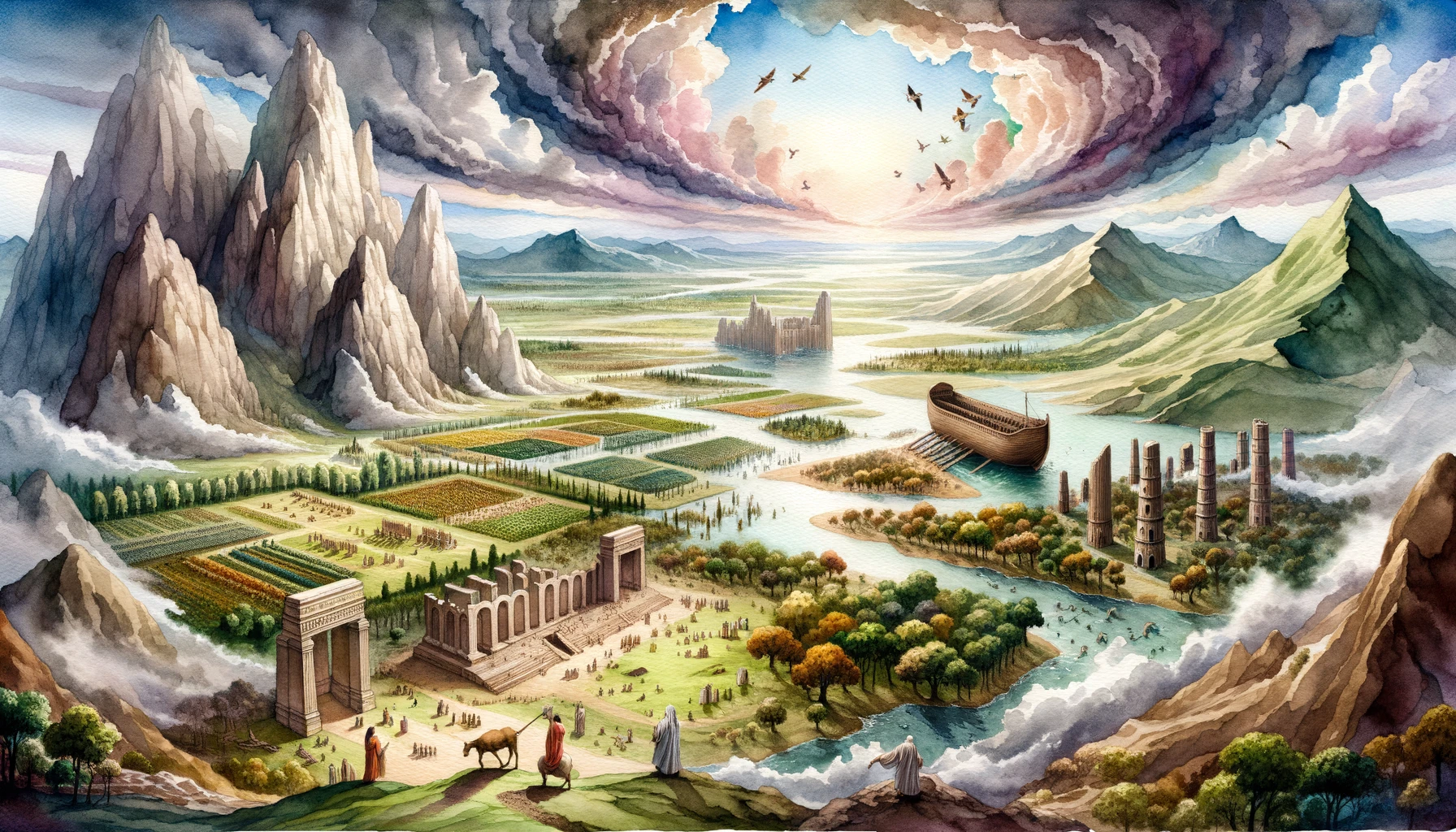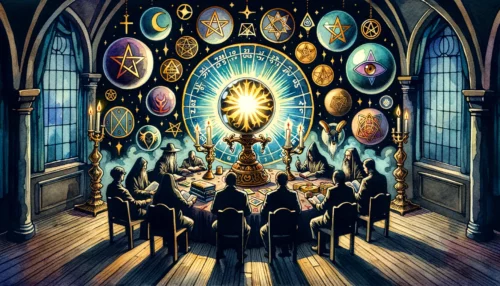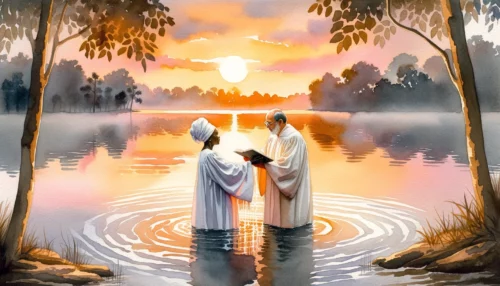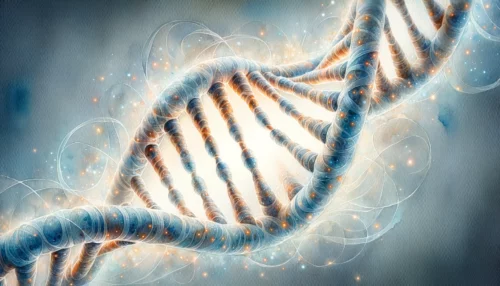The Book of Genesis, particularly its early chapters, has been a subject of intense scrutiny and discussion among theologians, scholars, and believers. Its narratives, filled with profound stories, metaphysical questions, and complex characters, can sometimes be regarded as allegorical or symbolic rather than historical fact. In this light, we question the seriousness with which we can approach these narratives: Are they metaphorical lessons or actual historical accounts? Or could they possibly be both?
Historical Accuracy versus Theological Truth: A Delicate Balance
When engaging with the early parts of Genesis, it’s important to acknowledge that a balance exists between historical accuracy and theological truth. These aren’t two competing perspectives, but rather complementary lenses through which we can understand these foundational narratives.
Genesis begins with the creation of the world, a seven-day event that introduces God as the omnipotent creator (Genesis 1:1-2:3). While some interpret this literally as a seven-day period, others see it as a metaphorical representation of a much longer, indeterminate process. Both views hold theological truths: God is the originator of all things, and His creative work is deliberate and purposeful.
The narrative then moves to the Garden of Eden, Adam and Eve, and their fall from grace (Genesis 2:4-3:24). It’s a story brimming with symbolism and profound theological insights. Some believe it’s a historical account of the first human beings, while others see it as an allegorical tale about humanity’s inherent tendency to sin. Yet, both perspectives underscore a key theological truth: humanity’s disobedience leads to separation from God, but God’s mercy provides hope for redemption.
The stories of Cain and Abel, Noah and the Flood, and the Tower of Babel (Genesis 4:1-11:9) further illustrate the themes of disobedience, punishment, mercy, and restoration. Each story carries with it theological truths about the human condition and God’s relationship with humanity. Whether these events happened exactly as described or serve as illustrative narratives, they hold immense value in understanding God’s nature and our relationship with Him.
In the grand scheme of things, the early parts of Genesis set the stage for the overarching narrative of the Bible. They provide context for the necessity of the covenant with Abraham, the formation of Israel, and ultimately, the coming of Jesus Christ. Whether viewed from a historical or allegorical perspective, these narratives deepen our understanding of God’s character and His plan for humanity.
The balance between historical accuracy and theological truth is a crucial aspect of understanding the early parts of Genesis. These narratives, whether viewed as historical fact or allegorical tales, carry profound theological truths about God and humanity. The importance of these narratives lies not merely in their historical validity, but in the fundamental truths they reveal about our relationship with God, our human condition, and God’s plan for redemption.
The Importance of Genesis in the Larger Biblical Narrative
Genesis isn’t just the beginning of the Bible; it’s the foundation on which the rest of the Biblical narrative is built. The early parts of Genesis play a pivotal role in setting the stage for understanding God’s relationship with humanity and His divine plan for redemption.
The narratives of Genesis introduce the theme of covenant, which is central to the entire Biblical story. God’s promise to Noah after the flood, not to destroy all life again, sets a precedent for future divine-human agreements (Genesis 9:8-17). The covenant with Abraham, promising him numerous descendants and a land for them, becomes the basis for the formation of Israel and the concept of a chosen people (Genesis 15:1-21).
Genesis also sets up the problem that the rest of the Bible seeks to solve: the problem of sin. The story of Adam and Eve in the Garden of Eden introduces the concept of sin, disobedience against God, and the consequent separation from Him (Genesis 3:1-24). This separation is what the rest of the Bible, through the narratives of the prophets, the wisdom literature, and the New Testament, seeks to address and rectify.
The genealogical accounts in Genesis, although sometimes overlooked, serve to connect different narratives and maintain continuity throughout the Bible. For example, the genealogy from Adam to Noah (Genesis 5:1-32) and from Noah to Abraham (Genesis 11:10-32) provides a historical thread that links the early parts of Genesis to the later narratives.
Genesis also anticipates the fulfillment of God’s promises in the New Testament. It paves the way for the coming of Jesus Christ, whose life, death, and resurrection ultimately provide the solution to the problem of sin introduced in Genesis. Through Christ, the separation between humanity and God caused by sin is mended (Romans 5:12-21).
Genesis is far more than just the first book of the Bible. Its narratives, characters, and themes are integral to the understanding of the entire Biblical story. From introducing the concept of covenant to setting up the problem of sin, the early parts of Genesis provide the necessary context for comprehending the rest of the Bible. The continuity provided by Genesis plays a crucial role in the coherence of the Biblical narrative, affirming the relevance and importance of taking Genesis seriously.
The Role of Faith in Interpreting Genesis
Faith plays a central role in how we approach and interpret the early parts of Genesis. It’s an integral part of our journey to understand God, His creation, and our place within it.
The creation account in Genesis, for instance, introduces us to an omnipotent and purposeful God who creates everything out of nothing (Genesis 1:1-2:3). Regardless of whether we view the creation account as a literal seven-day event or a more symbolic representation, our faith guides us to acknowledge God as the ultimate creator of everything that exists.
The narratives of Adam and Eve, Cain and Abel, Noah, and the Tower of Babel, convey profound truths about humanity’s nature and our relationship with God (Genesis 2:4-11:9). These stories highlight the human tendency towards disobedience, the consequences of sin, and God’s mercy and promise of redemption. Our faith helps us to see these theological truths, enriching our understanding of God and His plan for humanity.
Faith also helps us grapple with challenging aspects of these narratives. For example, the longevity of the early humans, like Methuselah who lived 969 years (Genesis 5:27), can be puzzling. Yet, our faith guides us to understand these accounts within the broader context of God’s interaction with humanity and His divine purposes.
Faith isn’t a blind acceptance of everything as literal fact. Rather, it’s a confident trust in God and His revealed truth, which allows us to engage with the early parts of Genesis in a meaningful and enriching way. It helps us to navigate between historical and allegorical interpretations, and recognize the theological truths that these narratives convey.
Faith is a guiding light in our journey through the early parts of Genesis. It allows us to engage with the narratives, discern their deeper meanings, and appreciate the profound theological truths they convey. Whether we view these narratives as historical events or illustrative stories, our faith enables us to understand them as revelations of God’s nature and His plan for humanity. Faith, therefore, plays a vital role in taking the early parts of Genesis seriously.
Casting a New Light on Genesis
We’ve journeyed through the early parts of Genesis, discussing its historical accuracy, theological significance, and the role of faith in interpreting these foundational narratives. It’s clear that these early chapters hold profound truths about God, humanity, and our relationship, regardless of how literally we interpret the events they describe.
To continue reflecting on this topic, here are three personal questions to ponder:
- How does your view of the early parts of Genesis shape your understanding of God’s character and His plan for humanity?
- How does the balance between historical accuracy and theological truth influence your engagement with these narratives?
- How does your faith guide your interpretation of the early parts of Genesis?
The early parts of Genesis, filled with tales of creation, disobedience, mercy, and hope, are not mere stories of a distant past. They’re foundational narratives that enrich our understanding of God and His divine plan. They invite us into a deeper relationship with our Creator, inspiring us to seek Him and His truth in every page of the Bible. As we journey through these narratives, let’s allow their profound truths to enlighten our minds, enrich our faith, and inspire our hearts.














